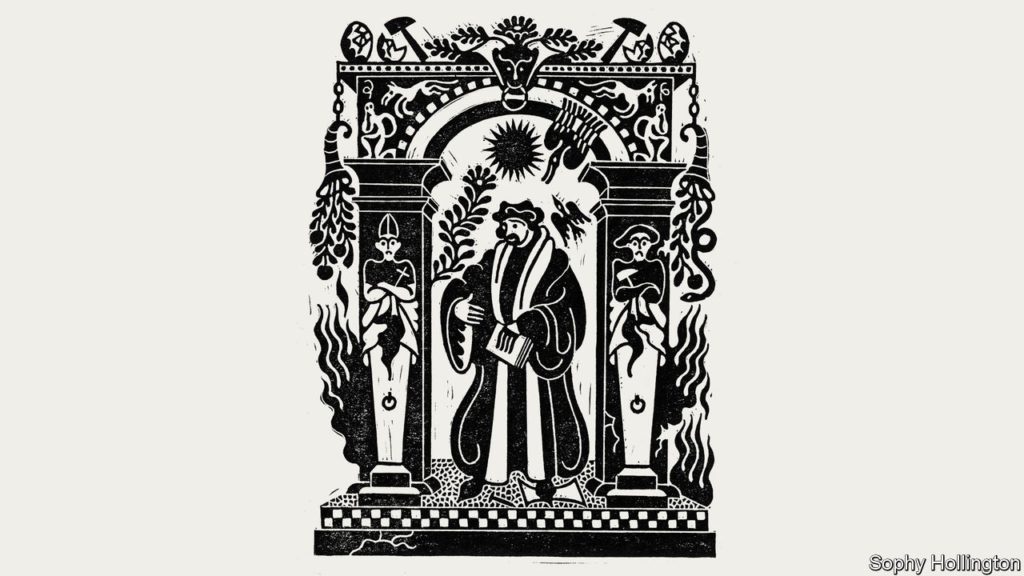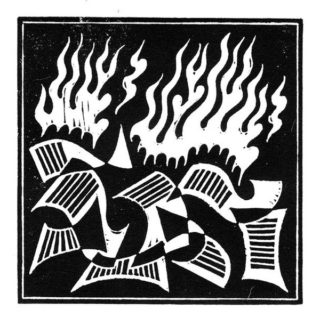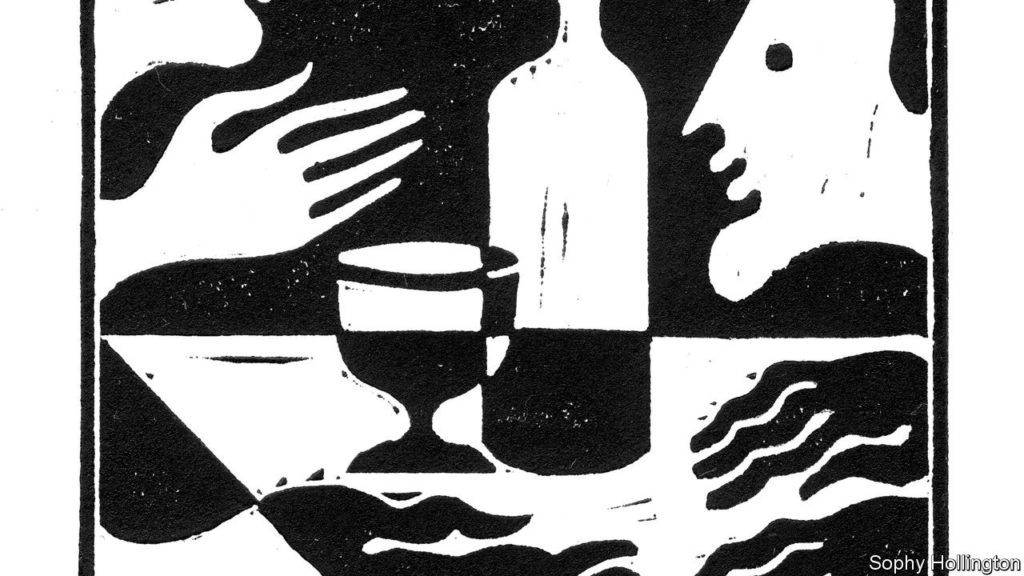He was a champion of moderation who had the misfortune to live in a revolutionary era
Desiderius Erasmus was the last great intellectual of a united Christian Europe: a scholar of universal renown, a friend to kings and tutor to princes, and a self-proclaimed “citizen of the world”. He produced a translation of the New Testament that changed the way Christians think about their faith. He also shaped popular culture. His dictionary rescued phrases such as “breaking the ice”, “teaching an old dog new tricks” and “leaving no stone unturned” from obscurity. His “In Praise of Folly” (1511) was hailed as a comic masterpiece.
In an age when birth was generally destiny, he was a self-made man. Born in the small provincial town of Rotterdam in 1466, the illegitimate son of a priest, he was dumped in a local monastery at the earliest opportunity. He grew up far from the centre of the Renaissance in northern Italy. His subsequent stardom was purely the result of his extraordinary intellectual gifts.
Unlike so many other great thinkers, in his time and since, Erasmus never fell prey to extremism. He believed in the healing power of moderation and reason, and in the civilising power of wine and conversation. This was partly a matter of personal style. He craved a life of scholarly comfort: “He lived in his study and died in his bed,” as the historian Hugh Trevor-Roper put it. Confronted with a king—and potential patron—he bent the knee; challenged by a bully, he changed the subject.
It was also a matter of conviction. Erasmus loathed the certitude of ideologues and worried about the tendency of extremists to goad one another into greater acts of fanaticism. In place of revolutionary certainty, he preached the Middle Way. The best way to reform the establishment was from within, he argued. The Catholic church should be reinvigorated by calling it back to its original purpose; society should be reformed by educating princes in the art of government.
But this moderate champion had the great bad luck to live in a zealous era. Soon after climbing to the intellectual and social pinnacle of Europe, Erasmus was thrown down and condemned. Only after his death was he given his due. His story is a warning to modern moderates, but also an inspiration.
When Erasmus left his monastery and began to explore the world, he was astonished by the sorry state of the church. Nepotism was rife. Popes fathered children and advanced them, disguised as nephews, into well-paid jobs. The largest businesses in Rome were the wine trade and prostitution. The papacy preyed on the credulity of the laity by selling indulgences—“forged pardons for real sins”, in Erasmus’s words. Leo X, pope during Erasmus’s glory years, was the spirit of corruption made pudgy and pampered flesh.
The church’s material self-indulgence was equalled by its intellectual desiccation. Universities were self-perpetuating oligarchies of obscurantists and suck-ups. A doctorate in theology at the Sorbonne took a minimum of eight years to complete and an average of 18. Erasmus described his teachers there as “quasi theologians” whose “brains are the most addled, tongues the most uncultured, wits the dullest, teachings the thorniest, characters the least attractive, lives the most hypocritical, talk the most slanderous, and hearts the blackest on Earth.”
How could the church be rescued from its torpor? Erasmus believed that the answer lay in rediscovering the spirit of Christ. He did not believe, as some Christians did, that it was necessary to get rid of your property and devote yourself to the poor. Rather, for Erasmus it meant producing a perfect translation of the Bible based on the best texts available, assembled from libraries across Europe. For how could you hope to imitate Christ unless you knew exactly what he had said and how he had lived? Renaissance scholars in Italy had provided a model of how to revive classical studies by producing improved classical texts. Erasmus’s great scholarly achievement was to import these techniques to northern Europe and apply them to biblical texts.
This inaugurated one of the great love affairs of his life, with ancient Greek. At the age of 30 he determined to make his Greek as good as his Latin (which was regarded as the best in Europe). He was astonished by what he found as he read classical Greek texts as well as fragments of the Bible. Whereas “we Latins have but a few small streams, a few muddy pools,” he wrote, “the Greeks possess crystal-clear springs and rivers that run with gold.” His “Novum Instrumentum” was the first Greek New Testament ever published. He put the Greek text next to the Latin Vulgate and his own “pure” Latin translation, which extirpated what he saw as linguistic corruptions in the church’s approved text.
Like the Protestants who would soon convulse Europe, Erasmus believed that Christ’s message should be taught by and to everybody. Forget the waffling of the theologians: a “few truths are enough.” And forget the superstructure of the church: what really matters is the Word. “I would have women read the Gospels and the Epistles of St Paul…I would have the ploughman and the craftsman sing them at work; I would have the traveller recite them to forget the weariness of his journey…True theology is possessed by every man who is possessed of the spirit of Christ, be he digger or weaver.”
Erasmus’s scholarly distinction brought him success in the secular world as well as the religious one. His admirers included almost all the crowned heads of Europe—the kings of France and Portugal were correspondents and the king of Scotland a pupil. He was a particular favourite of the ruler of his native state, Archduke Charles, who, as Charles v, went on to become Holy Roman Emperor and the most powerful man in Europe. Hans Holbein the younger, whom Erasmus supported, painted several portraits of him. Though he enjoyed the flattery, Erasmus used his connections to pursue a higher goal—to persuade the rulers of Europe to lead their people into an era of Christian enlightenment. What better way to reform government in an age of royal power, he calculated, than to educate the royals themselves?
His “Education of a Christian Prince” (1516) was written as practical advice to Archduke Charles. Erasmus argued that the king is a servant of the people and must rule according to the principles of honour and sincerity, a revolutionary notion disguised as flattery. In “The Prince”, published three years earlier, Machiavelli had argued that it was better for a ruler to be feared than loved. Erasmus argued, on the contrary, that it was better to be loved than feared, and suggested that the way to create a lovable prince was to give him a well-rounded humanist education. A ruler should be learned (“man unless he has experienced the influence of learning and philosophy is at the mercy of impulses that are worse than those of a wild beast”) and should cultivate the habits of gentleness and public service.
He proceeded to dish out advice to the class of educated Europeans who operated the machinery of the state. “Enchiridion Militis Christiani” (“Handbook of a Christian Soldier”) argued that Christianity was above all an ethical system of charity, love and generosity. A succession of school textbooks were designed to show that classical learning was a joy rather than a chore. In place of mechanical grammar books he produced selections of the great classical authors. Technology helped spread his fame. The printing press had been invented a quarter of a century before his birth and the great printers of his day (Thierry Martens of Lausanne, Jose Badius of Paris and Aldus Manutius of Venice) had established international distribution networks. “In Praise of Folly” was one of the first secular bestsellers, with more than 30 Latin editions appearing during Erasmus’s lifetime.
He thus embodied a new social ideal: the humanist scholar who rejected monkish asceticism and the arid scholasticism of the university professors. He was genial and civilised: after books, he liked nothing more than good food, good wine and good conversation. He had a gift for friendship, enjoying an intellectual romance with the English humanist Thomas More. But he also had a talent for mockery, which he wielded against the pompous, pedantic and closed-minded. “In Praise of Folly” attacked everyone from doctors (quacks and flatterers, in his eyes) to monks (donkeys braying out psalms that they had memorised because they could not read). This earned him a legion of fans: the Erasmians who thrived in courts across Europe and who pored over his every pronouncement.
Bulldozing the Middle Way
Erasmus’s happy world began to crumble in October 1517, when Martin Luther, his junior by 17 years, nailed 95 theses to the door of the Wittenberg Castle church. Erasmus sympathised with many of the young monk’s criticisms of the church. But he disliked Luther’s dogmatic temperament and feared the consequences of smashing the institution that, for all its faults, sat at the heart of European civilisation. Surely Luther’s extremism would provoke counter-extremism? And surely the battle would destroy the Christian humanism that Erasmus had spent his life cultivating?
Both sides of the emerging schism initially tried to win the great man’s approval. This put him into an impossible bind. He could not repudiate Luther without repudiating some of his own criticisms of the church. But he could not support the pope wholeheartedly without endorsing corruption. Reluctantly, Erasmus stuck with the Catholic church on the grounds that institutions are easier to reform than fanatical mobs inspired by a charismatic preacher. That soon seemed like bad judgment. Rather than taking Erasmus’s Middle Way, the church embraced religious orthodoxy, empowering the most reactionary elements in the hierarchy and stretching every sinew to destroy heresy.
Erasmus was reduced from hero to bogeyman. “My popularity, if I had any, has either cooled off so far that it scarcely exists, or has quite evaporated, or even has turned into hatred,” he wrote in 1523. Luther denounced him as an “enraged reptile”, “vainglorious beast” and “instrument of Satan”. The Catholic church denounced him as a proto-Luther. “Erasmus laid the eggs,” a monk from Cologne wrote; “Luther hatched them. God grant that we may smash the eggs and stifle the chicks.” One of his translators was burned at the stake. In 1546, ten years after Erasmus’s death, the Council of Trent exploded his life’s work by declaring that the Vulgate was the only acceptable translation of the Bible. In 1559 the Index of Prohibited Books banned his entire oeuvre, along with the works of 550 other writers. The edict was not withdrawn until 1966.
As Michael Massing shows vividly in “Fatal Discord: Erasmus, Luther and the Fight for the Western Mind” (2018), the growing religious battle destroyed Erasmianism as a movement. Princes had no choice but to choose sides in the 16th-century equivalent of the cold war. Some of Erasmus’s followers reinvented themselves as champions of orthodoxy. The “citizen of the world” could no longer roam across Europe, pouring honeyed words into the ears of kings. He spent his final years holed up in the free city of Basel. The champion of the Middle Way looked like a ditherer who was incapable of making up his mind, or a coward who was unwilling to stand up to Luther (if you were Catholic) or the pope (if you were Protestant).
Yet the next hundred years of European history bloodily confirmed Erasmus’s warnings about the dangers of religious extremism. Luther denounced the pope as the Antichrist while comparing Rome to Sodom and Gomorrah; the pope called Luther a “roaring sow”. Then came the book-burning and the statue-smashing. Finally, the fanatics graduated to burning their fellow human beings at the stake. The cycle of intolerance was matched by a cycle of self-righteousness. Protestants competed with their fellow Protestants, and Catholics with their fellow Catholics, to see who possessed the purest heart and the fiercest faith. The test of being a good Christian ceased to be decent behaviour. It became fanaticism: who could shout most loudly? Or persecute heresy most vigorously? Or apply fuel to the flames most enthusiastically?
Erasmus had predicted that Luther’s theological complaint would lead to war. In time, he wrote, “the long war of words and pamphlets” would be waged “with halberds and cannons”. He was proved right many times over as fanatical passions fired terrible conflicts. The Thirty Years War killed more than a third of the German population and featured every imaginable atrocity, from torched villages to mass rapes to widespread torture, including waterboarding.
But great ideas are harder to kill than people. At first Erasmian ideas went underground—an astonishing fate for a philosophy that had thrived on the patronage of princes. Intellectuals preserved Erasmianism in private and talked about it in whispers. Then it began to resurface. The Jesuits smuggled elements of Erasmianism into their Catholic philosophy: Ignatius of Loyola based his “Spiritual Exercises” on Erasmus’s “Enchiridion”. Supporters of a more tolerant style of Protestant Christianity, such as the one that emerged in Britain after the Puritan revolution, dusted off their Erasmus. The most intellectually accomplished reviver of the Erasmian tradition was arguably a Jew, Spinoza, who put the notion of scepticism at the heart of his great treatise, the “Tractatus Theologico-Politicus”.
A world of folly
Erasmus is now celebrated by people of all religious inclinations and none. In his native city of Rotterdam a university, a grammar school and a subway station have been named in his honour. The European Union’s ambitious student-exchange programme, from which more than 10m have benefited, bears his name. The University of Toronto has produced an 89-volume edition of Erasmus’s collected works, one of the greatest scholarly projects of our time. Fittingly, one of the editors, James McConica, is a Roman Catholic priest who embodies Erasmus’s learned, epicurean style.
The spirit of the Middle Way has not conquered all—far from it. The West is now in the grip of rival extremisms that mock every principle that the great man held dear. Everywhere ideologues are breaking eggs and murdering chicks. In Britain, Brexiteers denounce “citizens of the world” as “citizens of nowhere” and cast out moderate politicians with more talent than they possess, while anti-Brexiteers are blind to the excesses of establishment liberalism. In America “woke” extremists try to get people sacked for slips of the tongue or campaign against the thought crimes of “unconscious bias”. Intellectuals who refuse to join one camp or another must stand by, as mediocrities are rewarded with university chairs and editorial thrones.
But the 16th-century humanist should give hope to those who resist competing bigotries. Erasmus shows that moderates are right to warn about the awful consequences of extremism and intolerance. He also proves that you can triumph in the long term even if you are crushed in the short term. Modern advocates of the Middle Way may not be rewarded with an 89-volume edition of their collected works. But they at least have the comfort that they were on the right side of history when their fellow intellectuals were taking the line of least resistance or maximum fanaticism.
By The Economist







